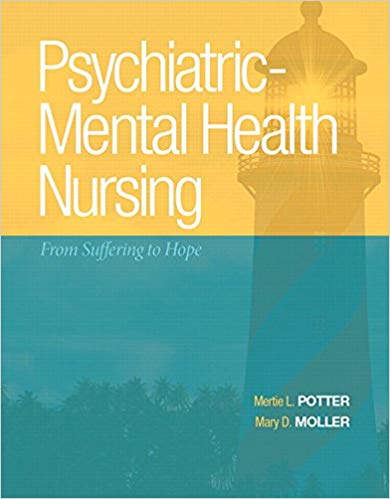Psychiatric Mental Health Nursing From Suffering to Hope 1st Edition By Mertie – Test Bank
Psychiatric Mental Health Nursing (Potter)
Chapter 4 Psychological Concepts: Theories and Therapies
1) Which theory or concept does a psychiatric nurse consider to be most closely aligned with Erikson’s developmental theory?
1. Freud’s psychosexual stages
2. Freud’s behaviorist concepts
3. Sullivan’s stages of interpersonal development
4. Maslow’s theory of self-actualization and hierarchy of needs
Answer: 3
Explanation: 3. Like Erikson, Sullivan believed that learning and development occur across the life span and that individuals can relearn tasks previously unaccomplished at earlier stages of life. Freud believed all developmental tasks were accomplished by a certain age, and tasks that remained unaccomplished resulted in fixation and caused lifelong psychiatric problems. Freud did not develop behaviorist concepts; furthermore, behaviorist concepts do not account for developmental tasks. Maslow proposed an order of basic human needs that were not linked to developmental stages or tasks. According to Maslow, physiological needs must be met before higher-level needs such as self-esteem and self-actualization.
Page Ref: 68
Cognitive Level: Applying
Client Need/Sub: Psychosocial Integrity
Standards: QSEN Competencies: 1.A.1. Integrate understanding of multiple dimensions of patient-centered care | AACN Essential Competencies: IX.1. Conduct comprehensive and focused physical, behavioral, psychological, spiritual, socioeconomic, and environmental assessments of health and illness parameters in patients, using developmentally and culturally appropriate approaches | NLN Competencies: Relationship-Centered Care: The role of family, culture, and community in a person’s development | Nursing/Integrated Concepts: Nursing Process: Assessment
Learning Outcome: Apply developmental theories that inform nurses’ understanding of patient development.
MNL LO: 1.2.3. Distinguish among the different psychosocial theories about the development of mental illness.
2) A 54-year-old patient tells the nurse that she is very upset that her son has become involved in demonstrations protesting corporate lobbying. Which of Kohlberg’s stages of moral development does the nurse identify as her patient’s current stage?
1. Adaptation
2. Assimilation
3. Conventional
4. Pre-conventional
Answer: 1
Explanation: 1. In the conventional stage, the individual focuses on doing his or her duty to keep the social order, which the patient would prefer her son to do. Adaptation and assimilation are concepts of Piaget’s cognitive theory, not Kohlberg’s stages of moral development. The pre-conventional stage is characterized by avoidance of punishment.
Page Ref: 72
Cognitive Level: Analyzing
Client Need/Sub: Psychosocial Integrity
Standards: QSEN Competencies: 1.A.1. Integrate understanding of multiple dimensions of patient-centered care | AACN Essential Competencies: IX.1. Conduct comprehensive and focused physical, behavioral, psychological, spiritual, socioeconomic, and environmental assessments of health and illness parameters in patients, using developmentally and culturally appropriate approaches | NLN Competencies: Relationship centered care: Promote and accept the patient’s emotions; accept and respond to distress in patient and self | Nursing/Integrated Concepts: Nursing Process: Assessment
Learning Outcome: Apply developmental theories that inform nurses’ understanding of patient development.
MNL LO: 1.4.4. Examine the components of the mental health assessment.
3) A 74-year-old male patient is distressed that he has not accomplished all that he hoped to in his life. Based on Erikson’s developmental stages, which conflict does the nurse consider this patient to be experiencing?
1. Integrity vs. despair
2. Generativity vs. stagnation
3. Identity vs. identity confusion
4. Autonomy vs. shame and doubt
Answer: 1
Explanation: 1. Integrity vs. despair occurs during late adulthood and involves finding satisfaction or dissatisfaction from examining one’s past. Generativity vs. stagnation happens during middle adulthood and involves accomplishment and concern for future generations. Identity vs. identity confusion is characteristic of an adolescent developing a sense of self. Autonomy vs. shame and doubt is the toddler’s developmental stage.
Page Ref: 70
Cognitive Level: Analyzing
Client Need/Sub: Psychosocial Integrity
Standards: QSEN Competencies: I.A.1. Integrate understanding of multiple dimensions of patient-centered care | AACN Essential Competencies: IX.1. Conduct comprehensive and focused physical, behavioral, psychological, spiritual, socioeconomic, and environmental assessments of health and illness parameters in patients, using developmentally and culturally appropriate approaches | NLN Competencies: Relationship centered care: Promote and accept the patient’s emotions; accept and respond to distress in patient and self | Nursing/Integrated Concepts: Nursing Process: Assessment
Learning Outcome: Apply developmental theories that inform nurses’ understanding of patient development.
MNL LO: 1.2.3. Distinguish among the different psychosocial theories about the development of mental illness.
4) A nurse is working with a 9-year-old girl who has been diagnosed with leukemia. Using Piaget’s cognitive theory of development, what are some specific ways in which the nurse should interact with the child? Select all that apply.
1. Give clear information regarding treatment.
2. Recognize and respect her need for increased privacy.
3. Show the child items or equipment that will be used in treatment.
4. Assess for and encourage the child to participate in favorite activities.
5. Provide an opportunity to touch or play with medical equipment before assessments and procedures.
Answer: 1, 3, 4
Explanation: 1. The child is at the concrete operational stage when reasoning begins; she should be able to understand when clear information is presented and concrete items are used in explanations. Encouraging participation in favorite activities supports normal developmental processes. The need for privacy is usually typical of adolescence. Touching and playing with equipment is advised at an earlier developmental stage.














Reviews
There are no reviews yet.